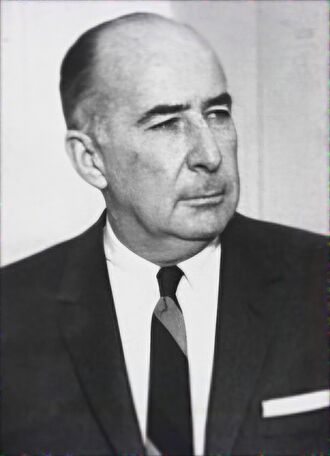John N. Mitchell
|
| “ | You will be better advised to watch what we do instead of what we say. | „ |
| ~ John N. Mitchell |
John Newton Mitchell (September 5, 1913 – November 9, 1988) was an American lawyer, the 67th Attorney General of the United States under President Richard Nixon, chairman of Nixon's 1968 and 1972 presidential campaigns, and a convicted criminal. Prior to that, he had been a municipal bond lawyer and one of Nixon's closest personal friends.
After his tenure as U.S. Attorney General, he served as chairman of the Committee for the Re-Election of the President. Due to multiple crimes he committed during the Watergate scandal, Mitchell was sentenced to prison in 1977 and served 19 months.
As Attorney General, he was noted for personifying the "law-and-order" positions of the Nixon Administration, amid several high-profile anti-Vietnam War demonstrations.
Biography[edit]
Mitchell played semiprofessional hockey while working his way through Fordham University (New York City) and Fordham law school. During World War II he served in the Navy as a torpedo boat commander.
It was for his expertise in state and municipal bonds that Mitchell achieved fame while an attorney with a prominent New York law firm. He became acquainted with Richard Nixon early in 1967, when their respective law firms merged. Mitchell quickly became a close political adviser to Nixon, and in 1968 he managed Nixon’s successful campaign for the presidency. Appointed attorney general, Mitchell took office in January 1969 and remained there until March 1972, when he resigned to head Nixon’s reelection committee.
From the outset, Mitchell strove to suppress what many Americans saw as major threats to their safety: urban crime, black unrest, and war resistance. He called for the use of "no-knock" warrants for police to enter homes, frisking suspects without a warrant, wiretapping, preventive detention, the use of federal troops to repress crime in the capital, a restructured Supreme Court, and a slowdown in school desegregation. "This country is going so far to the right you won't recognize it," he told a reporter.
During his tenure at the Justice Department, Mitchell became controversial for his backing of two of President Nixon’s nominees to the Supreme Court who were rejected as unqualified by the Senate, his approval of wiretaps without court authorization (declared unconstitutional by the Supreme Court), his prosecutions of antiwar protesters, and his suit to block publication of the so-called Pentagon Papers (rejected by the Supreme Court). Allegedly, Mitchell also played a central role in covert attempts to sabotage the 1968 Paris Peace Accords which could have ended the Vietnam War.
In an early sample of the "dirty tricks" that would later mark the 1971–72 campaign, Mitchell approved a $10,000 subsidy to employ an American Nazi Party faction in a bizarre effort to get Alabama Governor George Wallace off the ballot in California. The move failed.
In the days immediately after the Watergate break-in of June 17, 1972, Mitchell enlisted former FBI agent Stephen B. King to prevent his wife Martha from learning about the break-in or contacting reporters. While she was on a phone call with journalist Helen Thomas about the break-in, King pulled the phone cord from the wall. Mrs. Mitchell was held against her will in a California hotel room and forcibly sedated by a psychiatrist after a physical struggle with five men that left her needing stitches. Nixon aides, in an effort to discredit her, told the press that she had a "drinking problem".
Mitchell resigned as head of the Committee for the Reelection of the President in July 1972, shortly after the arrest of several men discovered burglarizing the headquarters of the Democratic National Committee in the Watergate apartment complex in Washington, D.C.
In 1974 he was indicted on charges that he had conspired to plan the break-in and that he had obstructed justice and perjured himself during the subsequent cover-up of the affair. He was convicted in 1975 and sentenced to 2 1/2 to 8 years in prison; he entered prison in 1977 and was released on parole in 1979. He was never brought to trial for having his wife kidnapped.
Around 5:00 pm on November 9, 1988, Mitchell collapsed from a heart attack on the sidewalk in front of 2812 N Street NW in the Georgetown area of Washington, D.C., and died that evening at George Washington University Hospital. He was buried with full military honors at Arlington National Cemetery, based on his World War II Naval service and his cabinet post of Attorney General.
- Modern Villains
- United States of America
- Male
- Deceased
- Republican Party villains
- Corrupt Officials
- Lawful Evil
- Cold war villains
- Grey Zone
- Criminals
- Imprisoned
- On & Off Villains
- Kidnapper
- Master Manipulator
- Control Freaks
- Conspirators
- Delusional
- Xenophobes
- Liars
- Incriminator
- Embezzlers
- Family of Victim
- Government support
- Fallen Heroes
- Military
- War Criminal
